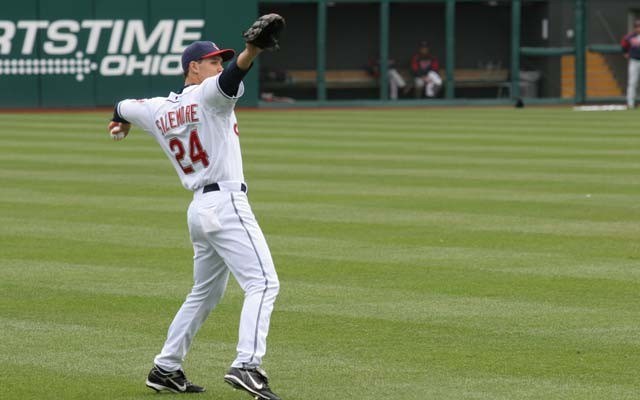I know, I know.
I'm a bad Canadian. The worst, perhaps.
I've been vocally anti-Toronto Blue Jays for decades, but especially now that they're good and gaining popularity, I've ramped it up to counter the "Canada's Team" and "everyone in the country is behind you" silliness that gets spewed out of the centre of the universe. Plus it's sometimes just enjoyable to play the heel.
While being antagonistic toward the Torontonian baseballers is all in good fun, it's much harder to do in the American League Championship Series.
After all, the Blue Jays' opponent in Cleveland sports a name and logo that, in this day and age, is in poor taste. In fact, Blue Jays broadcaster Jerry Howarth said before the series started that he's refused to utter the Cleveland nickname on the air for nearly 25 years after receiving a heartfelt letter from a fan. Others in the Toronto media have pledged to follow suit.
After all, the nickname is a misnomer for Indigenous people labelled by European colonizers who thought they had reached India. Sure, the name isn't as out-and-out offensive as the slur that doubles as the name of Washington's football team, but it still opens the door for some pretty despicable racial ignorance. At Cleveland's home opener in 2014, a white fan in redface and feathered headdress was confronted by a protester from the Apache Nation.
The team itself has allegedly tried to tone down its use of questionable imagery after announcing at the beginning of the season they were demoting the grinning Chief Wahoo caricature logo and instead wearing a blocky 'C' on its caps. In the playoffs to this point, though, the team has worn its toothy-faced caps.
There have been more heated discussions regarding Washington's football team. However, team owner Dan Snyder said he'll remain steadfast in keeping the name, citing platitudes that it stands for "honour, respect and pride" after a Washington Post poll claimed nine in 10 Native Americans surveyed don't find fault with the moniker. (A column in The Nation shortly after, though, questioned its methodology after discovering over half of the roughly 500 respondents couldn't even name the tribal nation when asked for more information about their heritage.)
The central question itself didn't allow those surveyed to say they liked the name, only whether it was offensive or if it "didn't bother" them. While nine per cent found the name offensive, we don't know how many actually give it a proper assent.
The name's proponents point to the poll and say the nine per cent should essentially be ignored. But the majority isn't always right because the majority isn't always impacted the most severely.
And, sometimes, loud minorities are able to make far-reaching changes. Far fewer than nine per cent of the American population expressed offence at Janet Jackson's bared breast during the Super Bowl in 2004, yet those who complained changed television for all viewers as censors developed itchy trigger fingers.
Since 2005, the American Psychological Association has called for the retirement of all Native American mascots after studies showed indigenous youth, arguably the most vulnerable group in the country, tended to suffer from lower self-esteem after exposure to the mascots.
Meanwhile, fans in Cleveland or Washington might have to buy a new jersey. Never mind that the diehards would have purchased one for any slight tweak or redesign anyway. Tough life.
In the Post story, some of those who took the poll claimed that they didn't mind being represented in team logos because it's better than not being represented at all. The article didn't dig any deeper, but those comments certainly come off as damning the name with faint praise. If there were better, fairer, deeper representation of these people and their stories were better amplified, then maybe, just maybe, they wouldn't feel the need to accept the consolation of a sports team's nickname as a reminder to the general North American population that they still exist.
That view certainly aligns with a criticism of change-the-name movements — "Don't these people have bigger things to worry about?" Well, sure. Arresting protesters in North Dakota at a pipeline site, or, especially in Canada, the plight of missing and murdered women, a lack of running water on some reserves, astronomically high food costs and troubling youth suicide rates are all ostensibly bigger issues than the name of a sports team.
But if professional leagues continue to allow a safe space for ignorant fans to dress up in traditional garb and perpetuate a low opinion of indigenous people, it diminishes the likelihood of respectful discourse around other, more pressing issues.
Besides, Cleveland has a perfectly suitable nickname it can resurrect within its baseball history — the Spiders, who took the field from 1887 to 1899.




